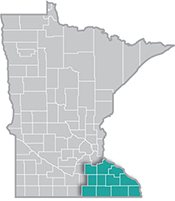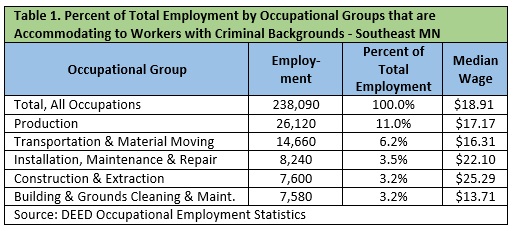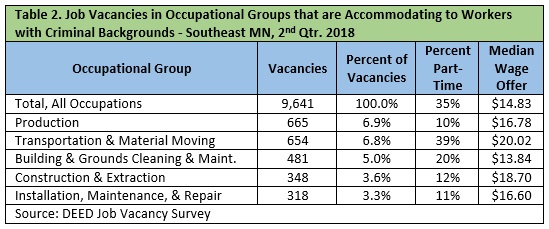 Southeast Minnesota is a health care and agricultural powerhouse. The region is home to the renowned Mayo Clinic and some of the world's most recognized food companies and brands.
Southeast Minnesota is a health care and agricultural powerhouse. The region is home to the renowned Mayo Clinic and some of the world's most recognized food companies and brands.
Advanced manufacturing is especially strong here, with machinery, chemicals, and electronics among the top products.
Want the freshest data delivered by email? Subscribe to our regional newsletters.
1/30/2019 3:00:00 PM
One of the most difficult employment barriers to overcome is having a criminal background – and it’s not as uncommon as some may think. According to We Are All Criminals, one in four individuals has a criminal record, whether is it a single incident or multiple offenses over time. Despite efforts to mitigate the impact of having a criminal past, such as Ban the Box regulations passed in Minnesota, one’s criminal history is still publicly available online and can easily be accessed by employers.
Several factors may make this barrier more or less severe, such as:
However, a criminal background is a barrier that can be surmounted, and many individuals with past criminal transgressions end up not only gaining employment, but ultimately having successful careers.
Often, the sticking point is finding that first job after being convicted of an offense. One piece of advice that can be offered is to find ANY job at first. While it might not be the dream job, the important thing to realize and accept is that this is just a starting point – one in which an individual can move on to a better job and, eventually, a career.
One key to success is remaining future-focused. While the first job may be in the ‘secondary sector’ (i.e., low-paying, part-time, and/or second and third shifts) and not ideal, it is just the first step to future success. This can be labeled as the ABCs of employment success after a criminal conviction – Anything, Better, and then a Career (Figure 1).

For that first job, certain occupational groups may be more accommodating to individuals with criminal backgrounds. And while it may be discouraging to feel limited to certain occupational groups, this is just the beginning and the employment can be temporary. The first job is an opportunity to develop a good work reputation, do some networking, and gain valuable references for future employment opportunities and/or promotions.
Five occupational groups that may be more accommodating are production; transportation and warehousing; installation, maintenance and repair; construction and extraction; and building and grounds cleaning and maintenance. These five groups make up over one-quarter of the total employment in the Southeast region, with production itself being the third largest employing occupational group at 11.0 percent (Table 1).


While having a criminal background can be a seemingly unconquerable barrier to gaining employment, this is not typically the case. One key to overcoming this barrier is finding that first job – any job – after conviction. From there, data show that in the Southeast region, plenty of solid employment opportunities in certain occupational groups exist that may be more accepting of applicants with criminal backgrounds.
Contact Mark Schultz.